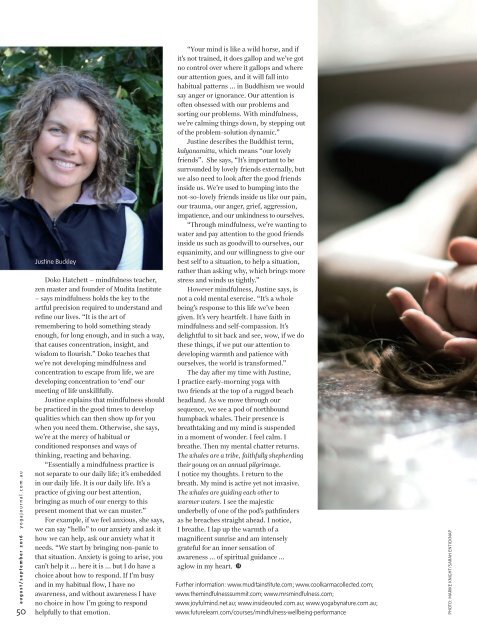Australian_Yoga_Journal_2016_08_09_downmagaz.com
You also want an ePaper? Increase the reach of your titles
YUMPU automatically turns print PDFs into web optimized ePapers that Google loves.
august/september <strong>2016</strong> yogajournal.<strong>com</strong>.au<br />
50<br />
Justine Buckley<br />
Doko Hatchett – mindfulness teacher,<br />
zen master and founder of Mudita Institute<br />
– says mindfulness holds the key to the<br />
artful precision required to understand and<br />
refine our lives. “It is the art of<br />
remembering to hold something steady<br />
enough, for long enough, and in such a way,<br />
that causes concentration, insight, and<br />
wisdom to flourish.” Doko teaches that<br />
we’re not developing mindfulness and<br />
concentration to escape from life, we are<br />
developing concentration to ‘end’ our<br />
meeting of life unskillfully.<br />
Justine explains that mindfulness should<br />
be practiced in the good times to develop<br />
qualities which can then show up for you<br />
when you need them. Otherwise, she says,<br />
we’re at the mercy of habitual or<br />
conditioned responses and ways of<br />
thinking, reacting and behaving.<br />
“Essentially a mindfulness practice is<br />
not separate to our daily life; it’s embedded<br />
in our daily life. It is our daily life. It’s a<br />
practice of giving our best attention,<br />
bringing as much of our energy to this<br />
present moment that we can muster.”<br />
For example, if we feel anxious, she says,<br />
we can say “hello” to our anxiety and ask it<br />
how we can help, ask our anxiety what it<br />
needs. “We start by bringing non-panic to<br />
that situation. Anxiety is going to arise, you<br />
can’t help it … here it is … but I do have a<br />
choice about how to respond. If I’m busy<br />
and in my habitual flow, I have no<br />
awareness, and without awareness I have<br />
no choice in how I’m going to respond<br />
helpfully to that emotion.<br />
“Your mind is like a wild horse, and if<br />
it’s not trained, it does gallop and we’ve got<br />
no control over where it gallops and where<br />
our attention goes, and it will fall into<br />
habitual patterns … in Buddhism we would<br />
say anger or ignorance. Our attention is<br />
often obsessed with our problems and<br />
sorting our problems. With mindfulness,<br />
we’re calming things down, by stepping out<br />
of the problem-solution dynamic.”<br />
Justine describes the Buddhist term,<br />
kalyanamitta, which means “our lovely<br />
friends”. She says, “It’s important to be<br />
surrounded by lovely friends externally, but<br />
we also need to look after the good friends<br />
inside us. We’re used to bumping into the<br />
not-so-lovely friends inside us like our pain,<br />
our trauma, our anger, grief, aggression,<br />
impatience, and our unkindness to ourselves.<br />
“Through mindfulness, we’re wanting to<br />
water and pay attention to the good friends<br />
inside us such as goodwill to ourselves, our<br />
equanimity, and our willingness to give our<br />
best self to a situation, to help a situation,<br />
rather than asking why, which brings more<br />
stress and winds us tightly.”<br />
However mindfulness, Justine says, is<br />
not a cold mental exercise. “It’s a whole<br />
being’s response to this life we’ve been<br />
given. It’s very heartfelt. I have faith in<br />
mindfulness and self-<strong>com</strong>passion. It’s<br />
delightful to sit back and see, wow, if we do<br />
these things, if we put our attention to<br />
developing warmth and patience with<br />
ourselves, the world is transformed.”<br />
The day after my time with Justine,<br />
I practice early-morning yoga with<br />
two friends at the top of a rugged beach<br />
headland. As we move through our<br />
sequence, we see a pod of northbound<br />
humpback whales. Their presence is<br />
breathtaking and my mind is suspended<br />
in a moment of wonder. I feel calm. I<br />
breathe. Then my mental chatter returns.<br />
The whales are a tribe, faithfully shepherding<br />
their young on an annual pilgrimage.<br />
I notice my thoughts. I return to the<br />
breath. My mind is active yet not invasive.<br />
The whales are guiding each other to<br />
warmer waters. I see the majestic<br />
underbelly of one of the pod’s pathfinders<br />
as he breaches straight ahead. I notice,<br />
I breathe. I lap up the warmth of a<br />
magnificent sunrise and am intensely<br />
grateful for an inner sensation of<br />
awareness … of spiritual guidance …<br />
aglow in my heart.<br />
Further information: www.muditainstitute.<strong>com</strong>; www.coolkarmacollected.<strong>com</strong>;<br />
www.themindfulnesssummit.<strong>com</strong>; www.mrsmindfulness.<strong>com</strong>;<br />
www.joyfulmind.net.au; www.insideouted.<strong>com</strong>.au; www.yogabynature.<strong>com</strong>.au;<br />
www.futurelearn.<strong>com</strong>/courses/mindfulness-wellbeing-performance<br />
PHOTO: MARIKE KNIGHT/SARAH ENTICKNAP


